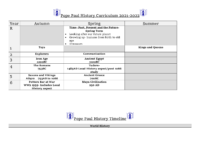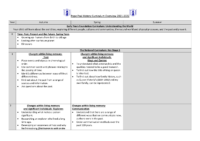History
History Curriculum Overview
Intent
At Pope Paul, we strive to inspire and excite our children to learn about the past, both in Britain and the wider world. We want them to be engaged critically, creatively and empathetically with the beliefs, struggles and achievements of past societies, events and cultures. We strive to develop our children’s awareness of chronology and connections between people over time. Throughout our teaching, children learn the skills of historical enquiry, and understand how our knowledge of the past is constructed from a range of sources. We expect our children to recognise that history, whilst being a record of what happened and why, may be open to interpretation.
As our children progress through each Key Stage, they acquire coherent knowledge and stimulate their curiosity to know more about the past. They are encouraged to ask perceptive questions, think critically, weigh evidence, sift arguments, and develop perspective and judgement. Through all of these skills, we encourage resilience through our Building Learning Power. Our history curriculum is also used to make connections to significant times and people relevant to our faith, which provides a context and deepens children’s understanding of Christianity. We use reading to enhance our history curriculum by offering a range of fiction and non- fictions texts related to our units of study.
We intend for all children including SEND and vulnerable pupils to be engaged and achieve in history. By the end of year 6, children will have a chronological understanding of British history from the Stone Age to the present day. They will be able to draw comparisons and make connections between different time periods. Interlinked with this are studies of world history.
The Early Years Foundation Stage follows the ‘Development Matters in the EYFS’ guidance which aims for all children in Reception to have an ‘Understanding of the World; people and communities, the world and technology’ by the end of the academic year. This provides the foundation of understanding which our Key Stage One learning builds upon.
History is taught in blocks of lessons. The amount of lessons in a block can vary to ensure coverage of the yearly objectives in the most appropriate way, although most will consist of 6. In KS1, three history units are taught per year and have been chosen to allow the foundations of the subject to be taught and prepare children for our KS2 curriculum.
In KS2, two units are taught each year. One is a British history unit and one is wider world study (although not in Year 4 to allow for the statutory post 1066 study).
British history is taught chronologically and is built upon each year in order to create progression. It allows children to make links between the topics and see how our country developed and changed over time. Wider world units are taught in this order to complement the curriculum in that year group so children make connections across their learning. Carefully planned key knowledge and skills ensure progression across topics throughout each year group across the school. Themes throughout the whole curriculum have been identified, so links are made between time periods. This allows children to recall prior learning so that information is remembered and can be built upon. Cross curricular outcomes in history are specifically planned for, with links between the history curriculum and literacy lessons enabling further contextual learning. Guided reading sessions are sometimes used to provide pre teaching.
Our local area provides a rich source of learning. Trips to local museums and historical sites ensure our pupils experience the impact of the time period or person in their own locality, making learning more relevant. Planning is informed by and aligned with the national curriculum. In addition, staff have access to the Key Stage History plans and resources. Each unit consists of a main question about the topic, which is then answered by breaking it in to smaller questions to focus each lesson. All units begin with a chronology lesson and end with an enquiry. Regular monitoring activities ensure relevant knowledge and skills are being included for each year group.
Implementation
Formative assessment is used throughout lessons to inform future lessons. Children are guided to achieve further through verbal feedback or written NSLs in line with the schools marking policy. Quality first teaching ensures children from all backgrounds are supported and extended. Rich learning opportunities such as trips and themed days provide excitement, enhance learning and build cultural capital. Summative assessment is reported at the end of each year. Data and transition meetings will highlight children working significantly above or below ARE.
Teachers are supported in their subject knowledge through information found on Key Stage History website. The subject leader organises staff inset to ensure staff are aware of the structure of the curriculum and what is being taught in other year groups. Staff confidence questionnaires allow the subject leader to support staff where required.
Impact
A rich and challenging curriculum is provided for all children at Pope Paul. Teachers use clear skills progression to plan and track learning so all children are ready for the next stage in their learning. Staff at Pope Paul work collaboratively and understand where their year group fits into the wider curriculum ensuring cohesion across the school. Children are well planned for through accurate starting points provided during transition. As they progress through each year, children know more, remember more and understand more about history. They understand and use the key skills of chronological understanding, knowledge and understanding of events in the past, historical interpretation, historical enquiry and organisation and communication. The large majority of children achieve age related expectations in history and all children achieve expected progress. Equipped with the tools and knowledge they need, they are prepared for the next stage of their learning journey when they leave Pope Paul.






